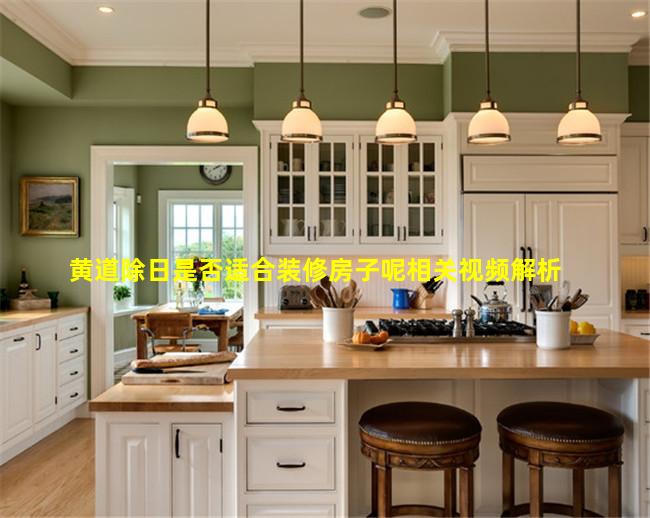





黄道除日是否适合装修房子?
视频解析:1. 黄道除日是什么?
黄道除日,又称“除夕”,是农历年的最后一天。
在传统习俗中,除夕是辞旧迎新的重要日子,人们会进行大扫除、贴春联、放鞭炮等活动。
2. 装修房子的吉日选择
传统上,人们认为装修房子应该选择吉日,以祈求平安顺利。
一般来说,吉日是指黄道吉日,即天干地支相合、相生之日。
3. 黄道除日是否适合装修房子?
不适合。黄道除日是辞旧迎新的日子,不宜进行大规模的动土或装修活动。
因为这些活动会破坏除夕的喜庆气氛,也可能影响新一年的运势。
4. 建议的装修时间
建议在农历正月初五(破五)之后再开始装修房子。
破五是传统习俗中破除禁忌的日子,适合进行新房装修等活动。
5. 其他注意事项
装修房子时,除了选择吉日外,还应注意以下事项:
避免在夜间装修,以免扰民。
装修材料要选择环保无害的。
装修过程中要做好安全防护措施。
结论:根据传统习俗,黄道除日不适合装修房子。建议在农历正月初五之后再开始装修,并注意选择吉日和做好相关注意事项。
黄道除日是否适合装修房子?
视频解析:视频黄道除日装修房子好不好?
视频内容:主持人:大家好,今天我们来聊聊黄道除日装修房子好不好。
专家:黄道除日是民间传统习俗,认为这一天是吉日,适合做一些大事。但从科学角度来看,装修房子是一个复杂的过程,需要考虑很多因素,如天气、材料、工期等,与黄道除日没有直接关系。
主持人:那黄道除日装修房子有什么讲究吗?
专家:民间有一些说法,如:
黄道除日宜动土,不宜上梁。
黄道除日宜开工,不宜完工。
黄道除日宜进宅,不宜搬家。
主持人:这些说法有科学依据吗?
专家:没有科学依据。装修房子是一个系统工程,需要根据实际情况合理安排工期,与黄道除日无关。
主持人:那黄道除日装修房子需要注意什么?
专家:需要注意以下几点:
天气情况:黄道除日可能天气寒冷或潮湿,影响施工进度和材料质量。
材料选择:装修材料应选择质量合格、环保的,与黄道除日无关。
工期安排:装修工期应合理安排,避免因黄道除日而赶工。
验收标准:装修完成后应严格验收,确保质量合格,与黄道除日无关。
结论:黄道除日装修房子是否合适,与科学无关,主要取决于天气、材料、工期等实际因素。民间说法仅供参考,不应作为装修决策的依据。

“黄道吉日中的黄道除日”是指黄道十二宫中不适合进行重要活动的特定日子。
在传统中国历法中,黄道十二宫被分为十二个时辰,每个时辰对应一个地支。其中,有六个时辰被认为是“黄道”,即:
子时(23:0001:00)
丑时(01:0003:00)
辰时(07:0009:00)
未时(13:0015:00)
戌时(19:0021:00)
亥时(21:0023:00)
而“除日”是指黄道十二宫中剩下的六个时辰,即:
寅时(03:0005:00)
卯时(05:0007:00)
巳时(09:0011:00)
申时(15:0017:00)
酉时(17:0019:00)
戌时(23:0001:00)
在传统习俗中,人们认为在“除日”进行重要活动,如结婚、搬家、开业等,会带来不吉利。因此,在选择黄道吉日时,通常会避开“除日”。
黄道除日可以入宅。
黄道除日,又称“除夕”,是农历十二月的最后一天,是辞旧迎新的日子。这一天,人们会打扫房屋、贴春联、放鞭炮,以驱除邪祟,迎接新年的到来。
根据传统习俗,黄道除日是入宅的好日子。因为这一天是新旧交替之时,象征着新的开始,入宅可以带来好运和福气。